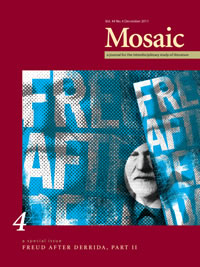Issue 44.4
Overview

Special Issue: Freud After Derrida, Part II
Published: December 2011
View the issue introduction or see the issue summary and contents below.
13 essays, totalling 224 pages
$24.95 CAD
This is the second of two special issues featuring selected proceedings from the Mosaic October 2010 Freud After Derrida conference. Papers from two of the conference keynote speakers open this special issue, which also includes essays on the archive, spectrality, mourning, chance, the crypt(ic), resistance, and ethical-political responsibility.
NightshiftSarah Wood This essay retains some characteristics of a talk and addresses the sensitivity and depth of Freud and Derrida’s thinking. It explores these qualities thematically: in storytelling, in literature, in Derrida’s reading of Freud, and in Freud. It also investigates the tensions and rhythms of academic writing life, attempting to communicate them to the reader as directly as possible. | |
Order Catastrophically UnknownDavid Wills The quandaries of Freud’s second metapsychological model, fully exposed in “Beyond the Pleasure Principle,” are analyzed via his analogy of the amoeba and its pseudopodium. Those quandaries emerge, on the one hand, as the problem of an inanimate that always already “mobilizes” the animate, and, on the other hand, as the impossible origin of what Derrida describes as autodeictic autobiography, understood here as life. | |
Pas au-delàMichèle di Bartolo Derrida découvre dans la psychanalyse une représentation de la subjectivité qui ouvre une brèche dans la clôture logocentrique. Cependant, quelque chose retient Freud à l’intérieur de la métaphysique. Après Derrida il faudra repenser les structures de pouvoir internes à la psychanalyse pour vaincre la résistance de celle-ci à elle-même. | |
Resistances―after Derrida after FreudSimon Morgan Wortham This essay seeks to reconsider the critical implications and effects of a deconstructive notion of resistance, notably in the wake of psychoanalysis. It does so in order to offer some reflections on the relationship between Derrida’s understanding of the unconditional and his thinking of différance. | |
Freud’s Cadence: Taking Chances with Julius CaesarChiara Alfano I propose to read Freud’s Non Vixit dream after Derrida’s “My Chances,” and via Shakespeare’s Julius Caesar and James Strachey’s “mistranslation” of Klang as “cadence.” Strachey’s translation seems to mirror Freud’s own reluctance to acknowledge the importance of sound in the dream work of Non Vixit, a reluctance that, as I will argue, goes hand in hand with his disinclination to dwell on the importance of chance in his interpretation of the said dream. I will finally put forth the hypothesis that, despite Freud’s avoidances, it is precisely in this correspondence between sound and chance that one of his most important, yet still largely unexamined, influences on Derrida lies. | |
Why Must I? A Freudian Response to the Question of Ethical-Political ResponsibilityStella Gaon In order to explain deconstruction’s “surplus of responsibility,” this essay reformulates Freud’s account of psychic integrity in terms of a subject that is constitutively split and yet compelled, categorically, to cohere. Freudian psychoanalysis thereby provides a quasi–legitimate account of the responsibility to render reason that deconstruction relentlessly pursues. | |
Derrida on Beckett or the Painful Freudian MarkJames Martell de la Torre This essay is prompted by the question of the possibility of an intrinsic understanding of Beckett in Derrida’s oeuvre. This singular understanding—which passes through psychoanalytic writing and its painful marks and paths—is perhaps what would have made Derrida avoid Beckett, or rather, avoid writing directly on Beckett. | |
Canopy of the Upturned Eye: Writing on Derrida’s CryptMaria O’Connor Derrida’s cryptic text Fors performs an unconditional and deconstructive return to Freud’s work on mourning through what this essay suggests is a silent and radical inscriptive opening onto an ethics of sexual difference. The title alludes to Derrida’s play in Points . . . Interviews with a homophonic dés and dais, dice and canopy, resonating chance with death in a “dais de l’oeil révulsé [canopy of the upturned eye]” and a new work of mourning. | |
“A name is sacred”: Archive Fever in Freud, Derrida, and Hubert AquinGarry Sherbert This essay begins by challenging Martin Hägglund’s claim that for Derrida nothing is sacred. On the contrary, both Derrida in his essay “How to Name” and Hubert Aquin in his Freudian novel Hamlet’s Twin exemplify archive fever, since they search for the poetic source of the sacred in names. | |
Spectres of Freud: The Figure of the Archive in Derrida and FoucaultAdina Arvatu In the last decades of the twentieth century the “archival turn” was added to the long list of tropisms in social and human sciences. This essay outlines the cultural, philosophical, and methodological stakes, in early Foucault and late Derrida, of this “thought of the archive,” to which psychoanalysis remains central. | |
“Wild” Freudian Psycho-Analysis: Ingestion, Incorporation, and Mourning in Derrida and Deleuze and GuattariLynn Hughey Engelbert Derrida’s and Deleuze and Guattari’s work on Freud produces charted yet uncharted territories: the Anti–Oedipal/Oedipal triangle and Freud’s corpus/corpse, mourning and melancholia, incorporation, ingestion/digestion in the work of such mourning, and, finally, psychoanalytic aesthetics. These “wild” territories are “de–territorialized” in deconstruction and schizoanalysis and allow psychoanalysis to go “wild.” | |
The Uncanniness of SpectralityDavid Meagher This essay contrasts Freud’s speculations on the biological refutation of an “internal necessity of dying” (innere Gesetzmassigkeit des Sterbens) with the uncanniness of the spectral apparition, rooted in fear, the concept of Unheimlichkeit, and the return of the ghost or phantom, the spectre itself. | |
Freud, Jung, and the Dangerous Supplement to PsychoanalysisGord Barentsen This essay assesses Jungian metapsychology as a “dangerous supplement” to Freudian psychoanalysis in historical, critical, and hermeneutic registers. Reading Jung otherwise offers a depth–psychological model with deconstructive valency unconstrained by Freudian metanarrative, and a Jungian analysis of what is unthought in Derridean deconstruction. |